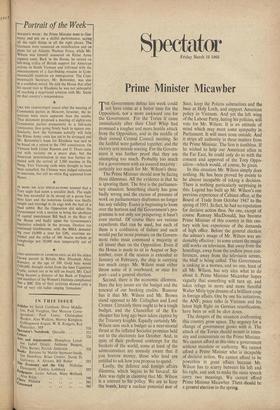Prime Minister Micawber
THE Government defeat last week could not have come at a better time for the Opposition, nor a more awkward one for the Government. For the Tories it came immediately after their Chief Whip had promised a tougher and more_hostile attack from the Opposition, and in the middle of their annual Central Council meeting. So the faithful were gathered together, and the victory sent morale soaring. For the Govern- ment it was further proof that they are attempting too much. Probably too much for a government with an assured majority : certainly too much for Mr. WilSon's three.
The Prime Minister should now befacing three dilemmas. All the evidence is that he is ignoring them. The first is the parliamen- tary situation. Something clearly has gone badly wrong and the excuse of pressure of work on parliamentary draftsmen no longer has any validity. Easter is beginning to loom over the horizon and the Government's pro- gramme is not only not prospering; it hasn't even started. Of course there are various expedients that can be used, but each of them is a confession of failure and each would put far more pressure on the Govern- ment (who must command a majority at all times) than on the Opposition. Even if the House is made to sit in August or Sep- tember, even if the session is extended to January or February, the ship is carrying too much cargo. Mr. Wilson must either throw some of it overboard, or steer for port—and a general election. Second, there is the economic dilemma. Here the key issues are the budget and the renewal of our banking credits. Rumour has it that Mr. Wilson and Mr. Brown stand opposed to Mr. Callaghan and Lord Cromer. Certainly there ought to be a tough budget, and the Chancellor of the Ex- chequer has long ago been taken captive by the Treasury knights. Equally certainly Mr. Wilson sees such a budget as a near-mortal thrust at the inflated Socialist promises held out to the electorate last October. And, in spite of their professed contempt for the. bankers of the world, some at least of the administration are uneasily aware that if you borrow money, those who lend are entitled to ask how you propose to spend.
Lastly, the defence and foreign affairs dilemma, which begins to be farcical. Sir Alec was right in claiming that Mr. Wilson is a convert to his policy. We are to keep the bomb, keep a nuclear potential east of Suez, keep the Polaris submarines and the base at Holy Loch, and support American policy in Vietnam. And yet the left wing of the Labour Party, hating his policies, will vote for Mr. Wilson. It is an attitude of mind which may meet some sympathy in Parliament. It will meet none outside. And it strips all authority in these matters from the Prime Minister. The lion is toothless. If he wished to help our American allies in the Far East, he could only do so with the consent and approval of the Tory Oppo- sition—which would, of course, be given.
In this situation Mr. Wilson simply does nothing. He has been proved by events to be almost incapable of taking a decision. There is nothing particularly surprising in this. Legend has built up Mr. Wilson's one previous experience of Cabinet office, at the Board of Trade from October 1947 to the spring of 1951. In fact, he had no reputation for decisive action then. No one, except of course Ramsay MacDonald, has become Prime Minister of this country in this cen- tury with less experience of the demands of high office. Before the general election the adman's image of Mr. Wilson was un- deniably effective: to some extent the magic still works on television. But away from the hoardings, away from the endless press con- ferences, away from the television screen, the bluff is being called. This Government is sinking in a morass, and no one, least of all Mr. Wilson, has any idea what to do about it. Prime Minister Micawber hopes vaguely that something will turn up, and takes refuge in more and more fanciful Walter Mitty type dreams of a brilliant coup in foreign affairs. One by one his initiatives, the ANF, peace talks in Vietnam and his latest high flight on German reunification, have been or will be shot down.
The dangers of the situation confronting this country grow apace. The urgency for a change of government grows with it. The attack of the Tories should mount in inten- sity and concentrate on the Prime Minister. We cannot afford at this time a government without mandate or authority. We cannot afford a Prime Minister who is incapable of decisive action. We cannot afford to be powerless in great affairs because Mr.
Wilson has to scurry between his left and his right, and seek to make the same speech carry two meanings. We cannot afford Prime Minister Micawber. There should be a general election in the spring.


































 Previous page
Previous page